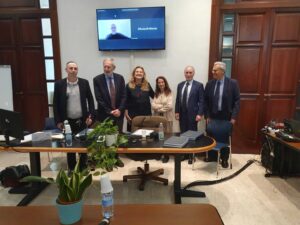UCEI – New graduation researches:
From 18th-century Livorno to proverbs in Judeo-Spanish
 Two students graduated last week obtaining a Union of the Italian Jewish Communities university degree in Jewish studies. In her paper Miryam Bahar offers an in-depth study on “proverbs in Judeo-Spanish with words in Turkish in the Ottoman Empire.” Sandro Daniele Sciaky, on the other hand, dealt with “unpublished eighteenth-century censuses of the Jews of Livorno.” Sciaky’s research analyzes three censuses kept in the archives of the Jewish Community of Livorno. The recent graduate writes in his thesis that the starting point was “family history research that led me to photograph and transcribe in full” documents that, although often been used by historians, have never been published or analyzed in detail. His study shows a significant quantitative fluctuation between surveys, which has two possible reasons, as Sciaky indicates in the introduction. The bias of the censuses “which may have overlooked a significant portion of the population each time.” Or, as the author shows, “a very high level of mobility, hitherto unknown, which massively changed the Jewish population of Livorno in a short period of time.”
Two students graduated last week obtaining a Union of the Italian Jewish Communities university degree in Jewish studies. In her paper Miryam Bahar offers an in-depth study on “proverbs in Judeo-Spanish with words in Turkish in the Ottoman Empire.” Sandro Daniele Sciaky, on the other hand, dealt with “unpublished eighteenth-century censuses of the Jews of Livorno.” Sciaky’s research analyzes three censuses kept in the archives of the Jewish Community of Livorno. The recent graduate writes in his thesis that the starting point was “family history research that led me to photograph and transcribe in full” documents that, although often been used by historians, have never been published or analyzed in detail. His study shows a significant quantitative fluctuation between surveys, which has two possible reasons, as Sciaky indicates in the introduction. The bias of the censuses “which may have overlooked a significant portion of the population each time.” Or, as the author shows, “a very high level of mobility, hitherto unknown, which massively changed the Jewish population of Livorno in a short period of time.”
Bahar’s choice also started from her own family background: “The impetus for writing this work,” she said, “was the gift I received from my paternal grandmother, the Judeo-Spanish, who in turn had inherited it from her parents and so on, back in time to the exiles who arrived in Istanbul from Spain in 1492.” The research deals specifically with proverbs (Refranes) influenced by the Turkish language and the evolution of Istanbul’s Sephardic community from then to the present day, “with particular attention to the period from 1860 – the year of the founding in Paris of the Alliance Israélite Universelle – to the early 2000s.”
Named after the memory of former UCEI president Renzo Gattegna, the BA degree in Jewish studies offers an all-round education between language, philosophy and literature. An articulation of the Italian Rabbinical College, it was recognized by the Ministry of Education back in 2003 and has since been operating as a full-fledged university institution. Those enrolled in the various courses now number about 60.
